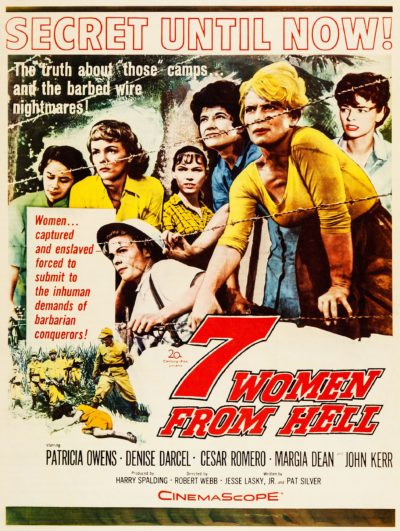★★½
“Circling hell”
 About the only review online I found for this, said it “may be the worst movie released in 1961.” I can only presume the writer of that statement has never seen The Beast of Yucca Flats. Even if I admit its weaknesses, Seven is nowhere near the same league of badness. Indeed, it starts off well, depicting the sudden invasion of Papua New Guinea by Japanese forces in 1942, with “enemy” civilians being herded into interment camps. The ones on the women’s side are a multi-national bunch, including Australian Grace Ingram (Owens), several Americans including Janet Cook (Craig), a German widow Ann Van Laer (Sylvia Daneel), Frenchwoman Claire Oudry (Darcel), and mixed-race nurse Mai-Lu Ferguson (Pilar Seurat).
About the only review online I found for this, said it “may be the worst movie released in 1961.” I can only presume the writer of that statement has never seen The Beast of Yucca Flats. Even if I admit its weaknesses, Seven is nowhere near the same league of badness. Indeed, it starts off well, depicting the sudden invasion of Papua New Guinea by Japanese forces in 1942, with “enemy” civilians being herded into interment camps. The ones on the women’s side are a multi-national bunch, including Australian Grace Ingram (Owens), several Americans including Janet Cook (Craig), a German widow Ann Van Laer (Sylvia Daneel), Frenchwoman Claire Oudry (Darcel), and mixed-race nurse Mai-Lu Ferguson (Pilar Seurat).
Initially, life is just about tolerable, with the camp commandant being mostly reasonable. But after he is killed in a bombing raid, his sadistic deputy takes over. When one of them knocks out a guard who tried to rape her, the women escape with the help of the camp doctor. But life on the outside is little better, especially with the Japanese in pursuit. Let’s just say, it doesn’t stay at seven women for very long. Without a compass, their odds of finding their way to safety are slim. Fortunately, they come across a downed American airman who has one. The bad news: he tells them their intended destination has already been abandoned. Then they meet the estate of German-Argentinean farmer Luis Hullman (Cesar Romero). Though is he as friendly as he initially appears to be?
It is important to realize this is very much a product of its era, when Hollywood was supremely disinterested in action heroines. We were still several years before even the arrival of Honey West on televisions, and there were few cases at the time where a female-led story-line would not be driven primarily by romance. It’s on that basis that the rating above has to be seen, cutting it some slack for the time in which it was made. By modern standards, sure, it’s fairly weak sauce. But the climax, where the women discover the truth about Luis and take action, feels progressive for the time. These women are – again, for the era – remarkably independent. They don’t need to be rescued by men: indeed, they’re the ones doing the rescuing of the airman.
The weakness is mostly on the character front, as outside of their nationalities, the protagonists are not given anything like an adequate amount of depth. The script doesn’t seem to know what to do with them once they are outside the confines of the prison camp either, at one point resorting to a bathing scene which had me rolling my eyes at the indignity of it all. Credit for not making the Japanese irredeemably villainous, though I’m not convinced the shooting location of Hawaii is an adequate stand-in for Papua New Guinea. Definitely not the worst movie released in 1961, by quite a considerable margin.
Dir: Robert D. Webb
Star: Patricia Owens, Denise Darcel, Margia Dean, Yvonne Craig




